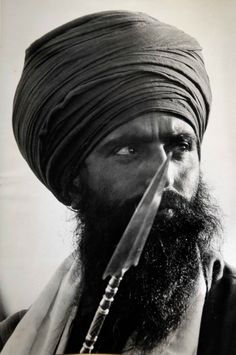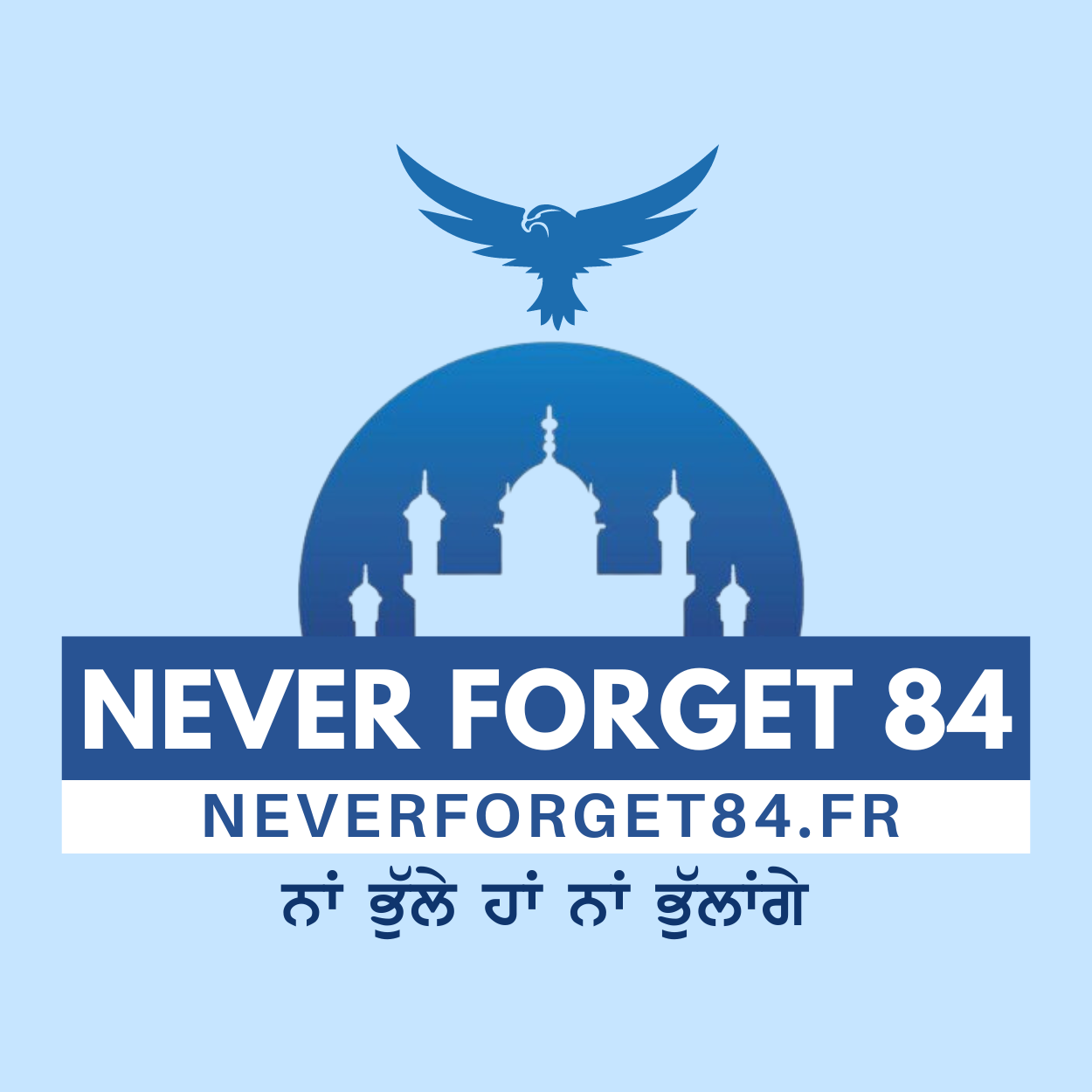Protecting Human Rights
The MovementFor HumanRights


SANT JARNAIL SINGH Ji & OPERATION BLUE STAR

Jarnail Singh Bhindranwale Ji
The most determined, charismatic, 20th century’s great General, the heart of the Sikh youth and freedom for sikh nation, Sant Jarnail Singh Jee Khalsa Bhindranwale was born on February 12th 1947 at village Rode, Dist Faridkot to Baba Joginder Singh and Mata Nihal Kaur Jee. He was Martyr to save SIkh Holy Place on 6 June 1984.
About Jarnail Singh
Jarnail Singh Bhindranwale or Jarnail Singh, a leader of the Damdami Taksal, a Sikh sect with roots in India, lived from February 12, 1947, until June 6, 1984. Many Sikhs in Punjab were heavily influenced by Bhindranwale. He made an effort to promote the Sikhism's founding principles and convinced young people to adhere to them. He rose to fame as a result of his advocacy for the establishment of Khalistan, a theocratic state based on Sikhism. The authorities detained Bhindranwale in 1981 because of his alleged role in Jagat Narain's murder, the owner of the Hind Samachar Group. He voluntarily turned himself in to the police, who kept him under tight observation until releasing him for lack of proof.
Bhindranwale gained more recognition for his participation in Operation Blue Star, in which he and other militants took control of Amritsar's Akal Takht complex, which included the Golden Temple. On instructions from Indian Prime Minister Indira Gandhi, the Indian Army assassinated him inside the revered temple of the Sikh religion. Bhindranwale has remained a contentious character in Indian history ever since he passed away. Others see him as a militant and an extreme, while some see him as a hero who died fighting for the rights of Sikhs.
Bhindranwale gained more recognition for his participation in Operation Blue Star, in which he and other militants took control of Amritsar's Akal Takht complex, which included the Golden Temple. On instructions from Indian Prime Minister Indira Gandhi, the Indian Army assassinated him inside the revered temple of the Sikh religion. Bhindranwale has remained a contentious character in Indian history ever since he passed away. Others see him as a militant and an extreme, while some see him as a hero who died fighting for the rights of Sikhs.
Early life
Bhindranwale was raised on a farm by his family after being born in the hamlet of Rode in the Punjab, India, Faridkot District. His father, Joginder Singh, was a farmer and a prominent Sikh figure in the area. The seventh of eight brothers, Jarnail Singh, maintained a strict vegetarian diet for his family. Up until 1965, Bhindranwale worked as a farmer before joining the Damdami Taksal, a mobile Sikh university near Moga, Punjab, which was then led by Gurbachan Singh Khalsa.
Bhindranwale started a year-long study in scriptural, theological, and historical Sikh studies under the direction of Gurbachan Singh Khalsa. Bhindranwale returned to his village a year later and resumed farming. He wed Bibi Pritam Kaur, the Bilaspur-born Bhai Sucha Singh's daughter. Ishar and Inderjit Singh, his two kids, were born to him by his wife in 1971 and 1975, respectively. 60-year-old Bibi Pritam Kaur passed away in Jalandhar on September 15, 2007, from a cardiac condition.
Gaining popularity
Bhindranwale interacted with Sikhs while travelling from village to village in Punjab as a religious missionary. He urged Sikhs to uphold the principles and teachings of Sikhism. He would deliver protracted talks and exhort many young people to consume Amrit, the holy nectar. Young Sikh males who had wandered from the path were encouraged to return by renunciating vices including sex, narcotics, and addictions by Bhindranwale in his sermons. Young Sikhs looked up to him as a hero because of his dedication to fighting for a cause. Kartar Singh Khalsa, who succeeded Gurbachan Singh Khalsa and perished in a car accident on August 16, 1977, identified Bhindranwale as the next Damdami Taksal chief. On August 25, 1977, Bhindranwale was formally elected during a bhog ceremony at Mehta Chowk.
Movement and politics for Khalistan
Bhindranwale previously commented in answer to inquiries regarding his political aspirations:
" If I ever become president of the Akali Dal or the S.G.P.C. [Shiromani Gurdwara Parbandhak Committee], an M.L.A., a government minister, or a member of parliament… I shall deserve a shoe-beating by you."
Despite making such claims, Bhindranwale engaged in some covert political activity. Bhindranwale ran forty candidates for a total of 140 seats in the SGPC elections in 1979; all but four of them were unsuccessful. A year later, during the general elections, Bhindranwale actively ran three constituencies for Congress. Bhindranwale himself decided against running for any political positions due to his lack of success in election politics. According to a 1984 Time Magazine article, Bhindranwale had overthrown the Shiromani Akali Dal, a Punjab-based Sikh political organisation due to his popularity. The political factions in Punjab were wary of taking important decisions without first consulting Bhindranwale because of his considerable power.
Bhindranwale was largely regarded as being in favour of the establishment of the hypothetical Sikhism-based theocratic state of Khalistan. He expressed purposeful vagueness in a BBC interview by saying that he would welcome the foundation of such a state if the government approved. Other statements ascribed to Bhindranwale include "we are not in favour of Khalistan nor are we against it." He is reported to have said, in response to Khalistan's formation, "We won't reject it. We won't go back to 1947. " He continued, "If the Indian Government invaded the Darbar Sahib complex, the foundation for an independent Sikh state will have been laid."
Function in Militancy
A small group of GurSikhs from the Akhand Kirtani Jatha went to condemn the Nirankaris on April 13, 1978. Thirteen Akhand Kirtani Jatha members and three Nirankaris were killed as a result of the altercation. Twenty-two people were listed in the FIR, including some known Bhindranwale allies. Sikhs became even more enraged when the administration blamed the victims. Gurbachan Singh, the head of the Nirankaris, had been assassinated on April 24, 1980. Nearly 20 people were included as suspects in the FIR, the majority of whom were connected to Bhindranwale. Later, the government accused Bhindranwale of planning the murder. Three years after the murder, Ranjit Singh, a member of the Akhand Kirtani Jatha, admitted to carrying it out and was given a thirteen-year prison sentence in the Tihar Jail. Bhindranwale was subsequently freed by the police, with Indian courts citing a lack of evidence that prevented them from charging him.
The owner of the Hind Samachar Group, Jagat Narain, was assassinated on September 9, 1981, next to the Amaltas Motel. One of Bhindranwale's most renowned rivals was Lala Jagat Narain. The police issued warrants for Bhindranwale's arrest two days after his murder. Police searched a village in Haryana called Chando Kalan, but no arrests were made. When Bhindranwale noticed that, he declared in the media that he would give up on September 20.
Bhindranwale was detained by the police on September 20, 1981, on suspicion of planning the murder of Lala Jagat Narain. Bhindranwale was detained for the next 25 days during which time random skirmishes occasionally broke out where his associates had assembled. On October 15, Bhindranwale was released on bail after India's Home Minister Giani Zail Singh stated in front of the Parliament that there was no proof in the case against Bhindranwale.
Death
The Indian Prime Minister Indira Gandhi launched Operation Blue Star on June 3, 1984, and instructed the Indian Army to encircle the Golden Temple complex in order to kill the militants there. Bhindranwale was given the status of "martyr" among the Sikhs as a result of widespread media coverage of his death during the procedure.
The body of Bhindranwale was identified by several organisations, including the police, the Intelligence Bureau, and Sikh warriors held by the Army, according to Lieutenant General Kuldip Singh Brar, who oversaw the operation. According to reports, Bhindranwale's brother also recognised the body. At least two widely read publications, Tragedy of Punjab: Operation Bluestar and After and Amritsar: Mrs. Gandhi's Last Battle, both contain images of what appear to be Bhindranwale's body. Bhindranwale's body was reportedly seen by BBC correspondent Mark Tully at his funeral as well.
The public relations adviser at Guru Nanak Dev University, Dilbir Singh, is among those who insist that he lived through the procedure. On the right side of his temple, he claimed Bhindranwale had suffered damage. He said that a government doctor had confirmed that he had been caught alive. He was murdered by torture. A picture of Bhindranwale in detention, according to R.K. Bajaj, a correspondent for Surya magazine. This assertion has faced fierce opposition, particularly from Bhindranwale's son, who is currently a significant player in Sikh politics. He is still alive, according to certain Damdami Taksal members. Jarnail Singh was declared a martyr in 2003 by the Shiromani Gurdwara Parbandhak Committee.
Legacy
While some Sikhs regarded Jarnail Singh Bhindranwale as a martyr, others saw him as a terrorist. Some praise Bhindranwale for his efforts to persuade the Sikh populace to adhere to the Guru Granth Sahib's doctrine. Famous Indian author Khushwant Singh once said, "[Operation Blue Star] gave the movement for Khalistan its first martyr in Jarnail Singh Bhindranwale." Joginder Singh Vedanti, the current jathedar of the Akal Takht, declared Bhindranwale a "martyr" in writing and gave his son, Ishar Singh, a robe of honour in 2003 during a ceremony hosted by the Shiromani Gurdwara Prabandhak Committee.
Bhindranwale is referred to in Harbans Singh's The Encyclopaedia of Sikhism as "a phenomenal figure of modern Sikhism." One of India's top political analysts, Vir Sanghvi, stated that many Sikhs still view Bhindranwale as a martyr. Even today, it is uncommon to find a Sikh politician who will dare to refer to him as the extremist and killer that he was. Some people think Bhindranwale aspired to become famous and build the theocratic state of Khalistan. Some people believe that Bhindranwale, who sought refuge in Amritsar's Akal Takht, is to blame for the start of Operation Blue Star.
